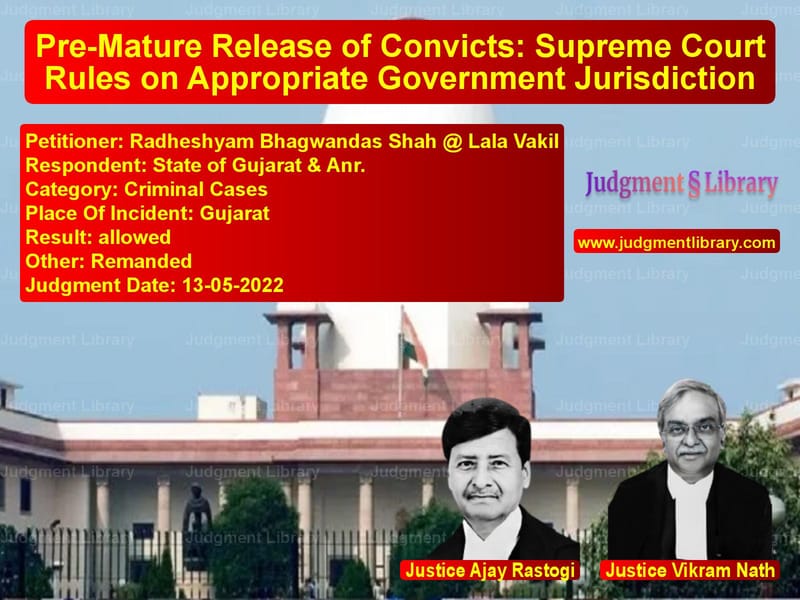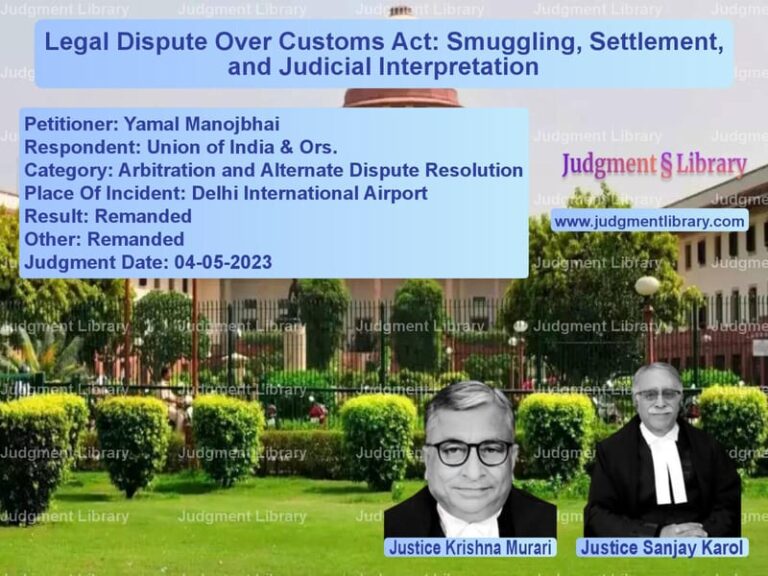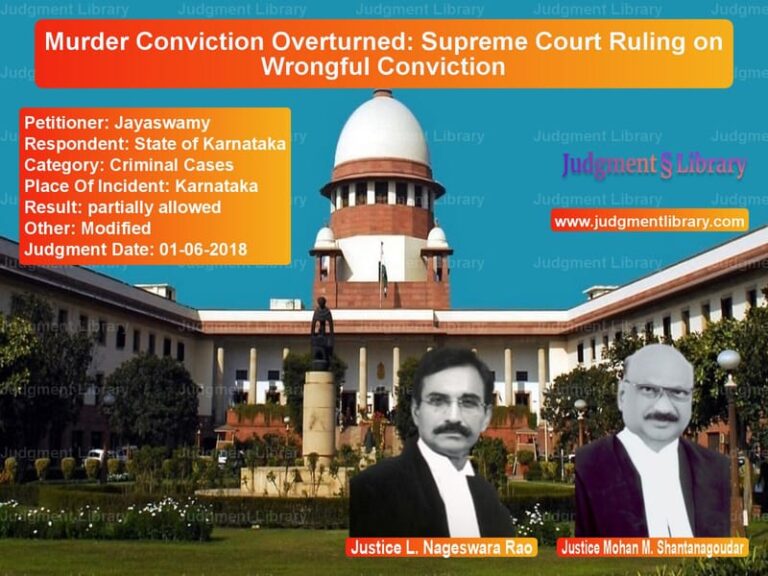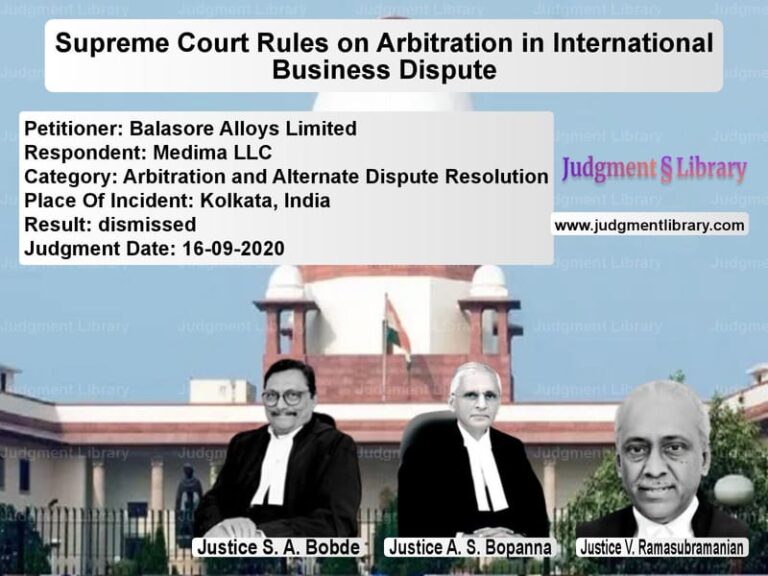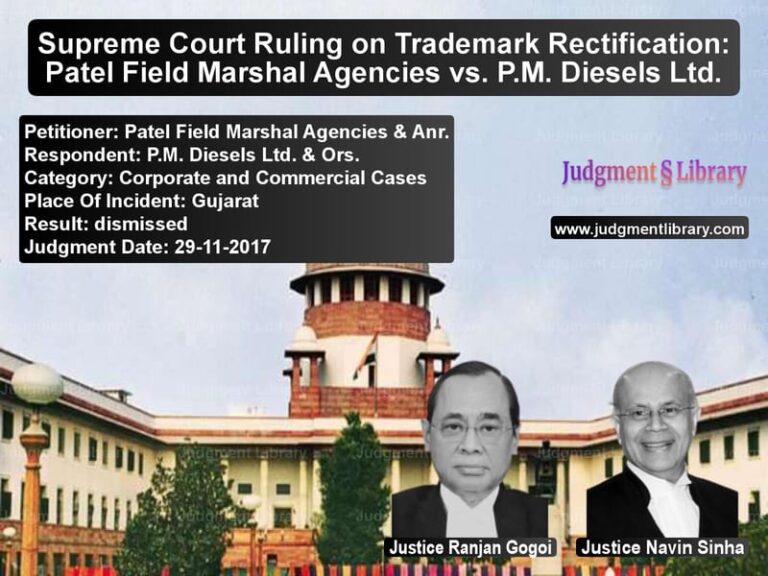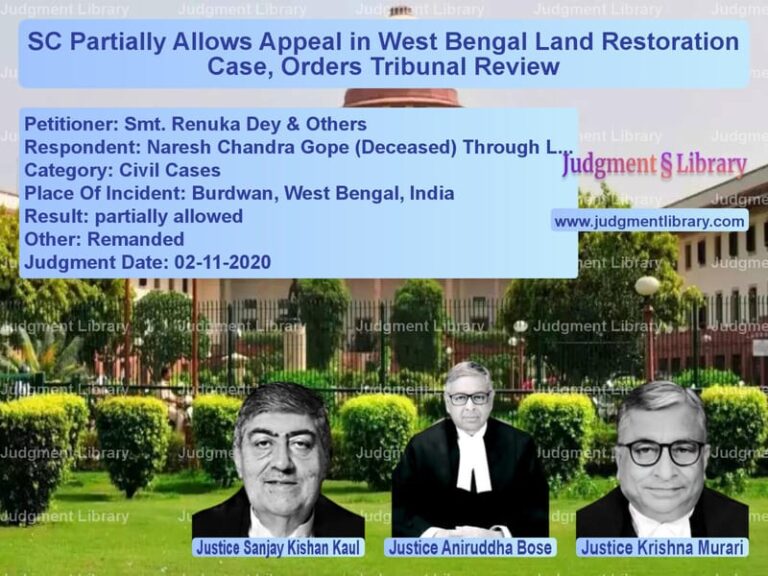Pre-Mature Release of Convicts: Supreme Court Rules on Appropriate Government Jurisdiction
The Supreme Court of India in the case of Radheshyam Bhagwandas Shah @ Lala Vakil vs. State of Gujarat & Anr. examined the legal framework for considering applications for pre-mature release of convicts and the appropriate government responsible for deciding such applications. The case revolved around a convict who had served more than 15 years in custody and sought remission under the 1992 Gujarat policy applicable at the time of his conviction. The apex court clarified that the state where the crime was committed is the competent authority to decide on pre-mature release, even if the trial was transferred to another state due to exceptional circumstances.
Background of the Case
The petitioner, Radheshyam Bhagwandas Shah, along with his co-accused, was convicted under Sections 302 and 376(2)(e)(g) read with Section 149 of the Indian Penal Code (IPC) for a crime committed in the State of Gujarat in 2004. Due to the peculiar circumstances of the case, the Supreme Court had earlier transferred the trial from Gujarat to Mumbai, where the petitioner was convicted and sentenced to rigorous imprisonment for life by a judgment dated 21st January 2008.
After spending more than 15 years in prison, the petitioner applied for pre-mature release under Sections 433 and 433A of the Code of Criminal Procedure (CrPC), citing the Gujarat Government’s policy dated 9th July 1992, which was in force at the time of his conviction. However, the Gujarat High Court dismissed his plea, stating that since the trial had concluded in Maharashtra, his application for pre-mature release should be filed in Maharashtra, not Gujarat.
Legal Issues and Arguments
The case primarily revolved around the interpretation of Section 432(7) of the CrPC and the concept of the “appropriate government” in matters related to remission and pre-mature release.
Arguments of the Petitioner:
- The petitioner contended that since the crime was committed in Gujarat, the appropriate government to decide his pre-mature release was the Gujarat Government, even though the trial had taken place in Maharashtra.
- He relied on the Supreme Court’s judgment in State of Haryana vs. Jagdish (2010) which held that the policy prevailing on the date of conviction should govern pre-mature release applications.
- He argued that the Gujarat Government’s 1992 policy, which was more favorable to convicts, should be applied in his case.
Arguments of the Respondents:
- The State of Gujarat opposed the petition, contending that since the trial was conducted in Maharashtra, the “appropriate government” as per Section 432(7) of CrPC was the Maharashtra Government.
- The respondents relied on the Supreme Court’s decision in Union of India vs. V. Sriharan @ Murugan (2016), which discussed the jurisdiction of state governments in remission cases.
- They argued that once a trial is transferred to another state, all subsequent matters, including remission, should be decided by that state.
Supreme Court’s Analysis and Judgment
The Supreme Court carefully analyzed the provisions of CrPC and relevant case law to determine which government had the authority to decide the petitioner’s application for pre-mature release.
The Court noted:
- “The crime in the instant case was admittedly committed in the State of Gujarat and ordinarily, the trial was to be concluded in the same State. In terms of Section 432(7) CrPC, the appropriate Government in the ordinary course would be the State of Gujarat.”
- The trial was transferred to Maharashtra only for exceptional reasons, and such transfer did not change the fact that Gujarat was the state where the crime occurred.
- “Once the crime was committed in the State of Gujarat, after the trial has been concluded and a judgment of conviction has been passed, all further proceedings, including remission or pre-mature release, have to be considered in terms of the policy applicable in the State of Gujarat where the crime was committed and not the State where the trial was transferred and concluded for exceptional reasons under the orders of this Court.”
- The Court rejected the respondents’ reliance on the Sriharan case, clarifying that Section 432(7) of CrPC does not allow concurrent jurisdiction between two states in remission matters.
Key Takeaways from the Judgment
- The Supreme Court reaffirmed that the “appropriate government” for considering pre-mature release applications is the state where the crime was committed, not where the trial was held.
- The judgment sets a crucial precedent ensuring that convicts are considered for remission based on the policies prevailing at the time of their conviction.
- Section 432(7) CrPC does not permit two state governments to have concurrent jurisdiction in remission matters.
- The Court directed the Gujarat Government to consider the petitioner’s application for pre-mature release under the 1992 policy and decide within two months.
Conclusion
The Supreme Court’s ruling in this case provides clarity on the interpretation of “appropriate government” in matters of remission and pre-mature release of convicts. The judgment ensures that convicts are not unfairly deprived of their rights due to procedural ambiguities, reaffirming the principle that remission policies in place at the time of conviction should govern such applications. This decision will have significant implications for similar cases where trials are transferred to other states for extraordinary reasons.
Petitioner Name: Radheshyam Bhagwandas Shah @ Lala Vakil.Respondent Name: State of Gujarat & Anr..Judgment By: Justice Ajay Rastogi, Justice Vikram Nath.Place Of Incident: Gujarat.Judgment Date: 13-05-2022.
Don’t miss out on the full details! Download the complete judgment in PDF format below and gain valuable insights instantly!
Download Judgment: radheshyam-bhagwanda-vs-state-of-gujarat-&-a-supreme-court-of-india-judgment-dated-13-05-2022.pdf
Directly Download Judgment: Directly download this Judgment
See all petitions in Bail and Anticipatory Bail
See all petitions in Fraud and Forgery
See all petitions in Custodial Deaths and Police Misconduct
See all petitions in Judgment by Ajay Rastogi
See all petitions in Judgment by Vikram Nath
See all petitions in allowed
See all petitions in Remanded
See all petitions in supreme court of India judgments May 2022
See all petitions in 2022 judgments
See all posts in Criminal Cases Category
See all allowed petitions in Criminal Cases Category
See all Dismissed petitions in Criminal Cases Category
See all partially allowed petitions in Criminal Cases Category

